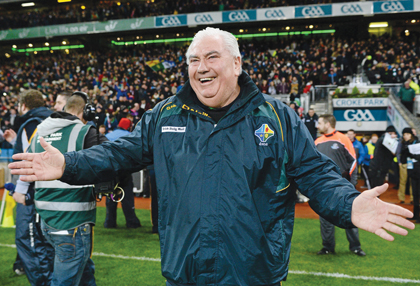
Joe Kernan has plenty of experience of winning titles
Aiming for a fifth McKenna Cup title in a row, with nine already secured as well as three All Ireland titles, endorses the quality of Mickey Harte’s motivational skills in his reign as Tyrone manager.
Joe Kernan has long ago demonstrated his motivational qualities via three All Ireland Club titles and one All Ireland county title as Armagh manager.
The O’Neill’s, Michael and Martin, will be expected to portray again in the European Championship this summer the motivational qualities that they showed during their respective qualifying series with the two Irish squads.
Last week in Part One, I outlined 16 motivational exercises to be used as a coach. This week I round off my ‘menu’ of motivational methods with another:
17. Establish discipline
From the first day of preparation, establish your team purpose, your expectations and your role within the team in a way they know you’re serious, eg, whenever you blow a whistle ONCE (and only once), you expect them to run to you within five seconds. Never let up on positive discipline.
18. Talk to players one-to-one
At least once a week talk to players. Let them know as you speak to them that they are special to you and the team. Encourage them to talk to you and to suggest ideas. Engage them in one-to-one clinics to develop their skills; tactical and game sense awareness. Constantly reinforce your message.
19. Open lines of communication
Be an exceptional listener and constantly and consciously be open to them. Praise their effort and encourage them to do better. You’ll be amazed at results if you apply ‘18’ and ‘19’ constantly.
20. Playing is a privilege
Never a given entitlement. As a player value your team place and don’t let down those who didn’t make the team. By your example, establish the fact that if your punctuality, attitude and behaviour is poor you can’t train with the team ‘til you are positively committed.
21. Avoid team punishment
Establish, by your example as coach, that players have to be held accountable individually for their actions. If a player is regularly late, don’t punish the others by waiting for the late-comer. Discipline them positively, eg, training on their own. This helps all focus on what they believe is important.
22. Create team unity
If a team-mate is injured, all go to help. If a team-mate needs help, in whatever form (off and on the field), encourage all to be there for him/her. This leads to togetherness and players playing harder for each other.
23 Structure sessions properly
For example, printed on wall before training, photocopies available, when to give breaks, timing of activities, etc. Good structure breaks monotony, saves time, keeps things smooth flowing.
24. Change of face
Same old faces bore players. Bring in new coaches (short term) with fresh and different ideas yet support the team’s purpose and way of playing.
25. Communicate rules
Don’t assume players know their roles. By questions (two way), walking it through, video work, etc, let every player know exactly how they will contribute to the team – game plans on the field, behaviour away from it.
Remember, this is easier to do with gifted players. For the less gifted or less socially engaging, it’s a bigger challenge. Spending time with them so they buy in will create a ‘win-win’ situation.
26. Be consistent and enthusiastic
A coach’s mood is reflected in his players. Never have them saying, “I hope coach is in a good mood today.” You must be the role model of success. The environment you create and your behaviour to players (what and how you say and do), must be consistent, caring and enthusiastic to all.
27. Model motivation in all of our actions
Have fun, stay positive, explain simply what you expect of players (see 26).
It’s all about what you emphasise.
28. Develop a tradition and talk about it
As Crossmaglen have done. Talk about past greats and their stories to inspire and encourage. It’s ‘social proof’ I suppose. If they can do it, so can I.
29. Draw crowds and excitement
Anything you can do to draw larger crowds and generate excitement will improve motivation, eg, if your club can build ‘on site’ a children’s playground and it is supervised by club members (on rota) during games, watch families flock to your ground.
30. Players in leadership roles should lead by example
Choose/assign hard working players as leaders as their strong inner drive encourages them to lead by example.
Others will follow.
31. Reduce negative feedback
Never shout at or embarrass players in front of others. Praise them in public, fix them in private.
Give players time initially to correct themselves. Later you can positively help in a ‘one-to-one’ clinic.
32. Give lots of high fives
Instruct coaches, ‘leader’ players to high-five regularly in training and games. This improves players’ confidence and unity.
Try as many of the ‘32’ that you think you can use.
By effectively motivating your players, they’ll learn much faster, win more games, learn life lessons, improve skills faster, have more fun and become better players and people.
It’s the secret to keep control of your team to win ‘back’to-back’ titles.
Receive quality journalism wherever you are, on any device. Keep up to date from the comfort of your own home with a digital subscription.
Any time | Any place | Anywhere











